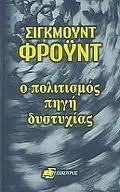
Το βιβλίο αυτό περιλαμβάνει τις δύο περίφημες μελέτες του Φρόυντ, "Ο πολιτισμός πηγή δυστυχίας" και "Το μέλλον μιας αυταπάτης", δύο μελέτες όπου ο Φρόυντ, χωρίς να εγκαταλείπει το πεδίο της ψυχανάλυσης, περνάει στον χώρο της ανθρωπολογίας και της κοινωνιολογίας, για να καταπιαστεί με δύο κεφαλαιώδη προβλήματα: την πρόοδο του πολιτισμού εις βάρος της ευτυχίας του ανθρώπου και την εξαγορά μιας απατηλής ευτυχίας μέσω της θρησκείας. Με εξαιρετικά παιδαγωγικό, διδακτικό και κατανοητό τρόπο, όπως εξάλλου είχε αποδείξει προηγουμένως στο "Τοτέμ και ταμπού" και στην "Ψυχολογία των μαζών και ανάλυση του Εγώ", που ανήκουν σε αυτόν τον κύκλο των βιβλίων που ασχολούνται με προβλήματα της κοσμοθεωρίας και του πολιτισμού, ο Φρόυντ μας παίρνει κυριολεκτικά από το χέρι και μας δείχνει τον κόσμο. Και αυτό το κάνει με τον τρόπο και τη σιγουριά των μεγάλων δασκάλων και διαφωτιστών : του Νίτσε, του Σοπενχάουερ, του Δαρβίνου, αλλά και του Σπινόζα, του Βολταίρου και του Ντιντερό. Λίγα βιβλία, και σε αυτά συγκαταλέγεται κατά γενική ομολογία και το "Ο πολιτισμός πηγή δυστυχίας", δίνουν στον αναγνώστη μετά την ανάγνωσή τους την πεποίθηση ότι έγινε πραγματικά σοφότερος.
Author

Dr. Sigismund Freud (later changed to Sigmund) was a neurologist and the founder of psychoanalysis, who created an entirely new approach to the understanding of the human personality. He is regarded as one of the most influential—and controversial—minds of the 20th century. In 1873, Freud began to study medicine at the University of Vienna. After graduating, he worked at the Vienna General Hospital. He collaborated with Josef Breuer in treating hysteria by the recall of painful experiences under hypnosis. In 1885, Freud went to Paris as a student of the neurologist Jean Charcot. On his return to Vienna the following year, Freud set up in private practice, specialising in nervous and brain disorders. The same year he married Martha Bernays, with whom he had six children. Freud developed the theory that humans have an unconscious in which sexual and aggressive impulses are in perpetual conflict for supremacy with the defences against them. In 1897, he began an intensive analysis of himself. In 1900, his major work 'The Interpretation of Dreams' was published in which Freud analysed dreams in terms of unconscious desires and experiences. In 1902, Freud was appointed Professor of Neuropathology at the University of Vienna, a post he held until 1938. Although the medical establishment disagreed with many of his theories, a group of pupils and followers began to gather around Freud. In 1910, the International Psychoanalytic Association was founded with Carl Jung, a close associate of Freud's, as the president. Jung later broke with Freud and developed his own theories. After World War One, Freud spent less time in clinical observation and concentrated on the application of his theories to history, art, literature and anthropology. In 1923, he published 'The Ego and the Id', which suggested a new structural model of the mind, divided into the 'id, the 'ego' and the 'superego'. In 1933, the Nazis publicly burnt a number of Freud's books. In 1938, shortly after the Nazis annexed Austria, Freud left Vienna for London with his wife and daughter Anna. Freud had been diagnosed with cancer of the jaw in 1923, and underwent more than 30 operations. He died of cancer on 23 September 1939.